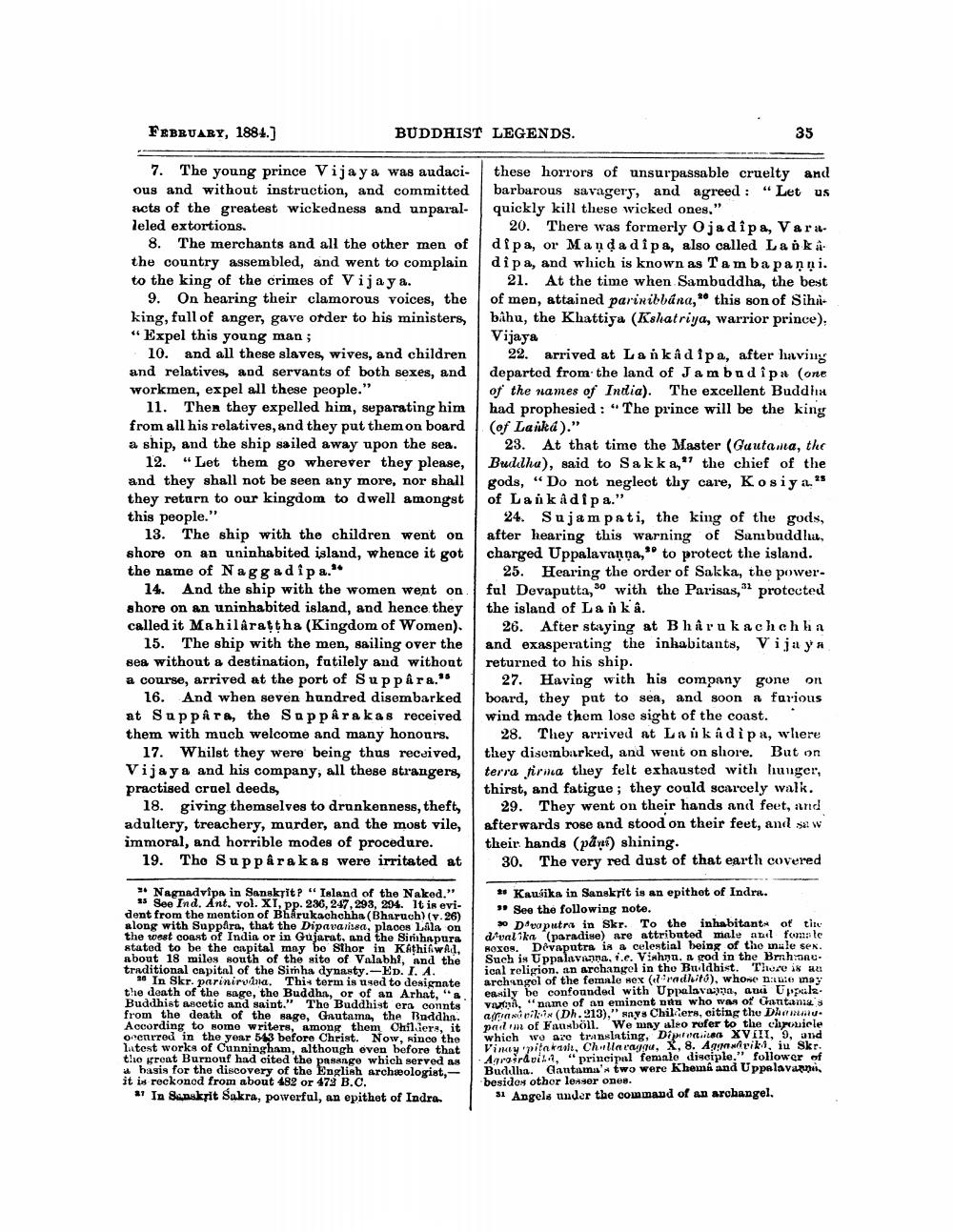________________
FEBRUARY, 1884.]
7. The young prince Vijaya was audacious and without instruction, and committed acts of the greatest wickedness and unparal leled extortions.
BUDDHIST LEGENDS.
8. The merchants and all the other men of the country assembled, and went to complain to the king of the crimes of Vijaya.
9. On hearing their clamorous voices, the king, full of anger, gave order to his ministers, "Expel this young man ;
10. and all these slaves, wives, and children and relatives, and servants of both sexes, and workmen, expel all these people."
11. Then they expelled him, separating him from all his relatives, and they put them on board a ship, and the ship sailed away upon the sea.
12. "Let them go wherever they please, and they shall not be seen any more, nor shall they return to our kingdom to dwell amongst this people."
13. The ship with the children went on shore on an uninhabited island, whence it got the name of Naggadipa."
14. And the ship with the women went on. shore on an uninhabited island, and hence they called it Mahilaraṭṭha (Kingdom of Women).
15. The ship with the men, sailing over the sea without a destination, futilely and without a course, arrived at the port of Suppâra."
16. And when seven hundred disembarked at Suppâra, the Suppârakas received them with much welcome and many honours.
17. Whilst they were being thus received, Vijaya and his company, all these strangers, practised cruel deeds,
18. giving themselves to drunkenness, theft, adultery, treachery, murder, and the most vile, immoral, and horrible modes of procedure.
19. The Suppârakas were irritated at
Nagnadvipa in Sanskrit ? "Island of the Naked." 35 See Ind. Ant. vol. XI, pp. 236, 247, 293, 294. It is evident from the mention of Bharukachchha (Bharuch) (v. 26) along with Suppfra, that the Dipavansa, places Lala on the west coast of India or in Gujarat, and the Simhapura stated to be the capital may be Sthor in KathiawAd, about 18 miles south of the site of Valabhi, and the traditional capital of the Simha dynasty.-ED. I. A.
28 In Skr. parinirvana. This term is used to designate the death of the sage, the Buddha, or of an Arhat, "a. Buddhist ascetic and saint." The Buddhist era connts. from the death of the sage, Gautama, the Buddha. According to some writers, among them Childers, it ocenrred in the year 543 before Christ. Now, since the latest works of Cunningham, although even before that the great Burnouf had cited the passage which served as a basis for the discovery of the English archaeologist,it is reckoned from about 482 or 472 B.C.
27 In Sanskrit Sakra, powerful, an epithet of Indra.
35
these horrors of unsurpassable cruelty and barbarous savagery, and agreed: "Let us quickly kill these wicked ones,"
20. There was formerly Oja dipa, Varadipa, or Manda dipa, also called Lankadipa, and which is known as Tam ba panṇi.
21. At the time when Sambuddha, the best of men, attained parinibbana," this son of Sihibahu, the Khattiya (Kshatriya, warrior prince). Vijaya
22. arrived at Lankâdipa, after having departed from the land of Jam budipa (one of the names of India). The excellent Buddha had prophesied: "The prince will be the king (of Lanka)."
23. At that time the Master (Gautama, the Buddha), said to Sakka," the chief of the gods, "Do not neglect thy care, Kosiya." of Lankidips."
24. Sujam pati, the king of the gods, after hearing this warning of Sambuddha, charged Uppalavanna," to protect the island.
25. Hearing the order of Sakka, the powerful Devaputta, 30 with the Parisas," protected the island of Lanka.
26. After staying at Bharukachchha and exasperating the inhabitants, Vijaya returned to his ship.
27. Having with his company gone on board, they put to sea, and soon a farious wind made them lose sight of the coast.
28. They arrived at Laika dipa, where they disembarked, and went on shore. But on terra firma they felt exhausted with hunger, thirst, and fatigue; they could scarcely walk.
29. They went on their hands and feet, and afterwards rose and stood on their feet, and saw their hands (pan) shining.
30. The very red dust of that earth covered
* Kausika in Sanskrit is an epithet of Indra. "See the following note.
30 Dvaputra in Skr. To the inhabitant of the divalika (paradise) are attributed male and foma le soxes. Devaputra is a celestial being of the male sex. Such is Uppalavanna, i.e. Vishnu. a god in the Brahaneical religion, an archangel in the Buddhist. There is an archangel of the female sex (dradhito), whose name may easily be confounded with Uppalavana, and Uppala vaa, "name of an eminent nau who was of Gautama s aandvikis (Dh. 213)," says Childers, citing the Dhammapad m of Fausböll. We may also refer to the chronicle which we are translating, Dipteasa XVIII, 9, and Vinay pitaka, Challa ragga, X, 8. Aggarik, iu Skr. Agrosravila, "principal female disciple." follower of Buddha. Gautama's two were Khema and Uppalavanni, besides other lesser ones.
31 Angels under the command of an archangel.




